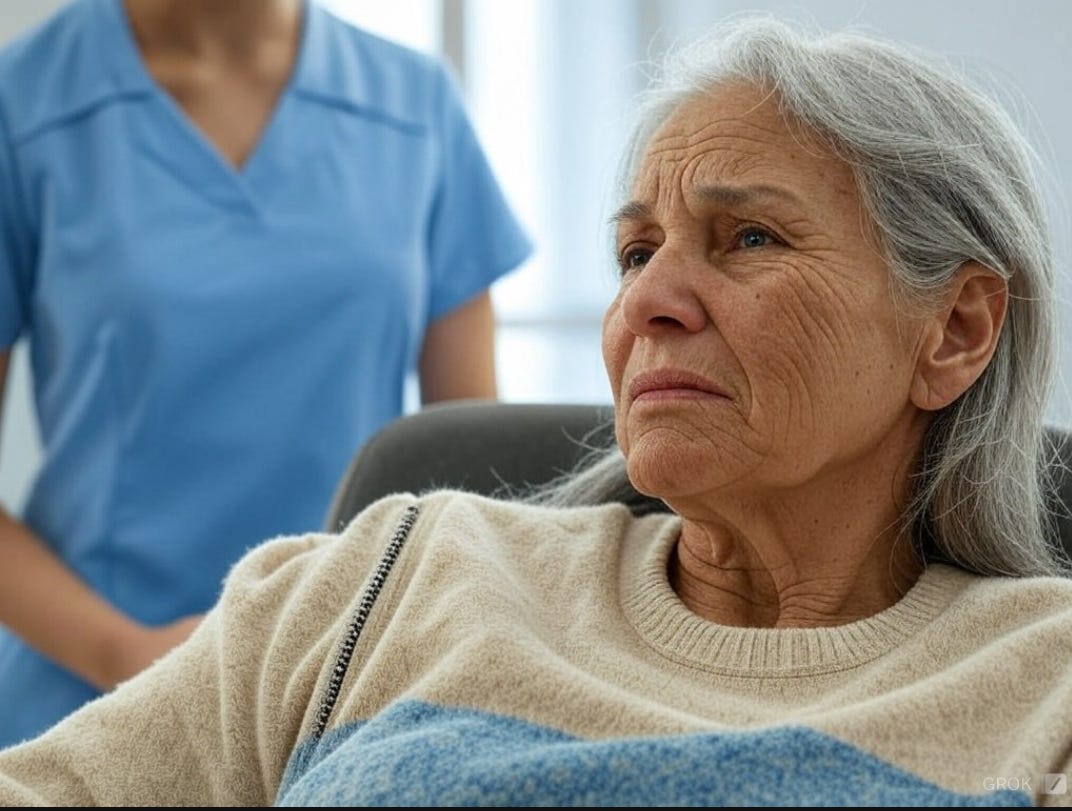|
 |
Archive and comments are only available to paid subscribers. We are grateful to paid subscribes supporting countless hours of research and advocacy. So please consider a paid subscription!
Suffering a stroke 15 minutes after Covid vaccine dose
What's the probability the vaccine caused the stroke?
The case and question
Zoe Harcombe sent me this message
“I met a woman whose mum (young, early 70s, super fit & healthy) had a stroke within 15 mins of her Pfizer booster. Mum is now immobile and unable to speak.
The daughter has applied three times to NHS BSA to have this recognised as due to the Covid jab. They keep rejecting her requests. I wonder if something mathematical or statistical could provide the proof she needs? You have a jab, you have a stroke - but how does she prove the jab caused the stroke!?
Thanks so much if you have any clever ideas.”
How to answer the question
To answer this question, we first have to estimate the probability of an early 70s, super fit and healthy woman suffering a stroke within 15 minutes of a covid vaccine purely by chance. Once we know that probability, we can compare it with the incidence of reported strokes of similar women within 15 minutes of a covid vaccine.
As it is unlikely we will have data about strokes that are specific for early 70s, super fit and healthy women, let’s first simplify things and assume we are talking about women aged 65+. According to AI searches the current annual stroke incidence for women aged 65+ in Western countries is approximately 200 per 100,000 women per year.
Next, we need to clarify the period over which we estimate the probability of a stroke within 15 minutes of a vaccine occurring by chance. I propose the period is 2 years and assume that a covid vaccine is taken once in each 6-month period (if the number of doses taken is lower/higher then, of course, the probability of a stroke by chance will be lower/higher respectively).
Given 200 strokes per 100,000 women per year, the probability that, in any 6 month period, a randomly selected woman aged 65+ will suffer a stroke is 1 in a 1000.
But in any 6-month period there are 183 x 24 x 4 = 17,568 specific 15-minute periods. Given that vaccinations do not take place at night it is reasonable to assume that vaccinations are only possible in, say, 40% of these 15-minute periods. That makes about 7,000 possible relevant 15-minute periods. So, the probability a randomly chosen woman aged 65+ suffers a stroke within 15 minutes of a vaccine purely by chance during a 6-month period is approximately 1 in 7 million. This means that:
the probability that a randomly chosen woman aged 65+ would suffer at least one stroke within 15 minutes of taking a vaccine, purely by chance, over a 2-year period is approximately 1 in 1.75 million.
(Note that this probability is also the same if we replace ‘taking vaccine’ with any ‘once in every 6-month’ event, such as such as perhaps having a routine GP visit, or hand-writing a letter).
That is a very low probability. However, there are about 6 million women aged 65+ in the UK, so in any 2-year period it is very likely that at least one woman will suffer a stroke within 15 minutes of a vaccine purely by chance (the probability is approximately 97%). In fact, we would expect an average of between 3 and 4 such cases.
So, while it is incredibly unlikely (1 in 1.75 million chance) that a specific woman aged 65+ would suffer a stroke purely by chance within 15 minutes of a vaccine within a 2-year period, it is almost certain that at least one woman somewhere in the UK would, with the expected number being 3 or 4. It is possible that the Mum in this case was one of the very few such unlucky women.
So did the vaccine cause the stroke?
This still does not answer the question about causation in this particular case. The additional data that we really need to test the causation hypothesis are the actual number of women aged 65+ who suffer a stroke within 15 minutes of a vaccination over any two-year period. We know there is at least one, namely the mother of the woman that Zoe met. If, over any 2-year period of the vaccines, this number is much greater than the expected number of 3 or 4, then we can conclude it is very probable that there is causation.
Now records of adverse reactions following vaccination are typically provided at no lower level of granularity than days. So, at best, we can search for those suffering strokes within 24 hours of vaccination. My colleague Scott McLachlan did the search using VAERS with the search terms:
"stroke", "cva" and "cerebral". Delimiters: covid-19 vaccines, all brands and Onset of Symptoms: 1 day.
It returned a total number of 145,299 records.
Obviously, only a proportion of those will be women aged 65+ and fewer still will be within 15 minutes of the vaccine. Moreover, the potential population of VAERS includes the whole of America and Europe. So, the total number of strokes recorded (within 15 minutes of vaccine) in VAERS in any population of 6 million women aged 65+ will be much less than the 145,299. However, set against that, we would need to consider the under-reporting rate of vaccine adverse reactions (at most 10% are reported) and the fact that any adverse reaction within 15 minutes – as opposed to 24 hours – of a vaccine is more indicative of causation anyway.
Multiple case studies suggest the vaccines do increase the risk of stroke
There have been multiple papers reporting actual cases of strokes most likely caused by the covid vaccines:
Kakovan et al (2022) “Stroke Associated with COVID-19 Vaccines” is a comprehensive review of cases up to the end of 2021 of “increasing reports of various types of stroke including ischemic stroke, and hemorrhagic stroke, as well as cerebral venous sinus thrombosis (CVST) after COVID-19 vaccination” The review includes 133 references, many of which describe how these vacccines may cause the strokes. They report on 35 cases of patients with ischemic or hemorrhagic stroke within 1 to 21 days after the vaccination. Most were women within the age range of 26-60 years. They report on 221 cases of patients with CVST; of these 75% were female with median age 46, but most received the vaccine at least 7 days before the stroke.
Schulz et al (2021) “COVID-19 Vaccine-Associated Cerebral Venous Thrombosis in Germany” reported on 62 cases of CVT, primary ischemic stroke, primary intracerebral hemorrhages, and other neurological events occurring within 1 month of a COVID-19 vaccination in Germany. Of these 76% were female with a mean age of 47. They concluded that in 58% of the CVT cases it was “highly probable” that the cause was the vaccine.
Al-Mahyani et al (2021) “Ischaemic stroke as a presenting feature of ChAdOx1 nCoV-19 vaccine-induced immune thrombotic thrombocytopenia”. The authors report on three cases of women in the UK who presented with ischaemic stroke which turned out to be vaccine-induced immune thrombotic thrombocytopenia (VITT) following the AstraZeneca vaccine. A similar detailed case is presented in Elaidouni et al (2022) “Acute ischemic stroke after first dose of inactivated COVID-19 vaccine: A case report
Michele et al “Malignant cerebral infarction after ChAdOx1 nCov-19 vaccination: a catastrophic variant of vaccine-induced immune thrombotic thrombocytopenia”. The authors report on two cases, both women aged 55 and 57 respectively.
Conclusion
There is about a 1 in 1.75 million probability that a randomly selected woman aged 65+ who takes 4 covid jabs in a 2-year period will suffer a stroke purely by chance within 15 minutes of one of the jabs. That is, therefore, an incredibly unlikely event. But, because there are about 6 million women aged 65+ in the UK, if they all took 4 covid jabs in a 2-year period we would expect 3 or 4 to suffer a stroke purely by chance. That means the Mum in this particular case could have been one such extremely unlucky woman.
However, there are many reported cases of healthy women (far more so than men) who have suffered strokes within days of a covid vaccine. Even without clinical evidence to determine if these cases could have been caused by the vaccine, the fact that there have been many more than the 3 or 4 ‘expected by chance’ cases, suggests that the vaccines significantly increase the risk of strokes in healthy women. Moreover, in most of the reported cases, the clinical case reports do suggest that the covid vaccine was a factor. While I do not have any medical training and have not seen any medical report in this particular case, I believe there is sufficient statistical evidence to conclude that the stroke was was far more likely to have been caused by the vaccine than by chance.
You’re currently a free subscriber to ‘Where are the numbers?’ For the full experience, upgrade your subscription.
